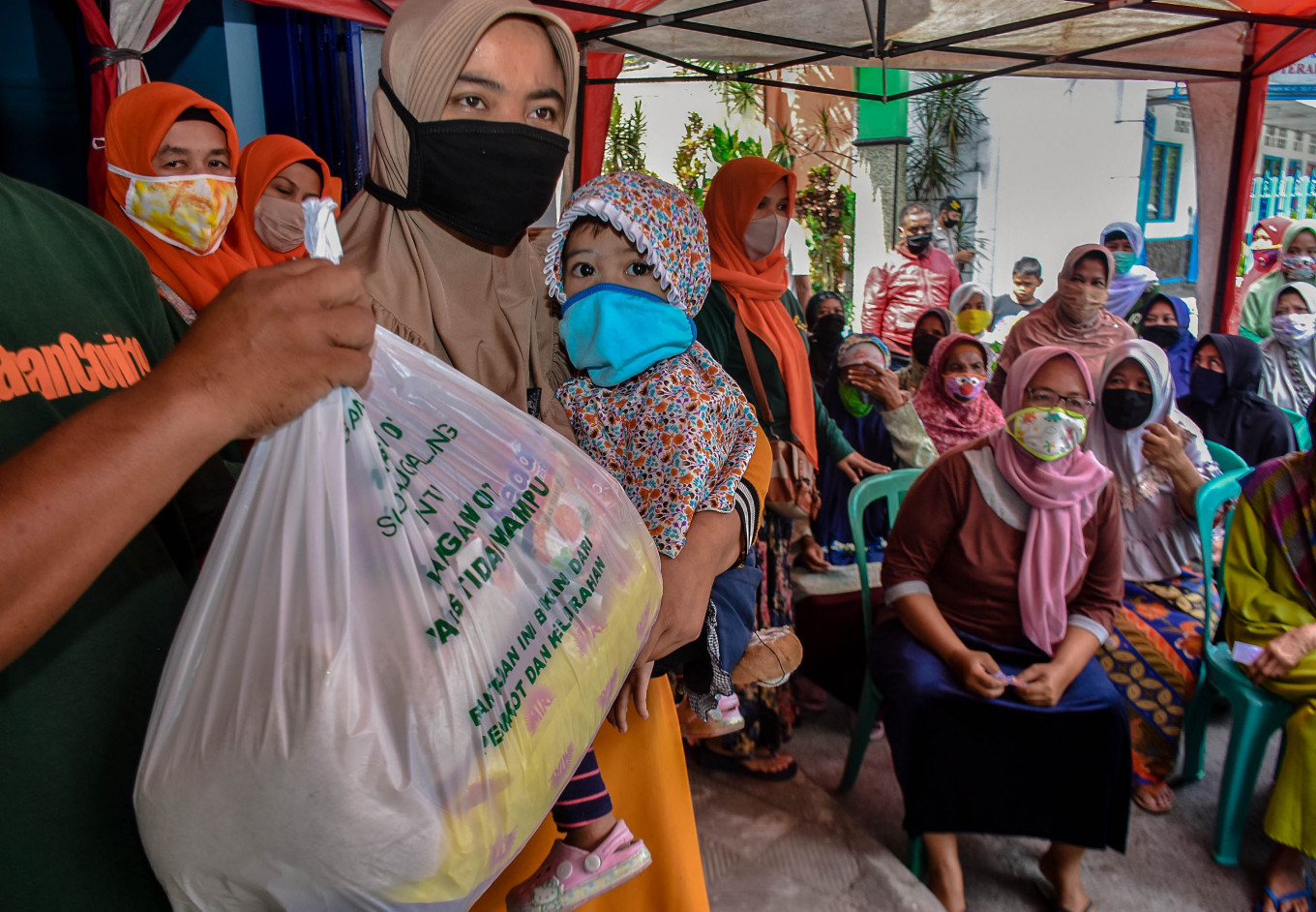Popular Reads
Top Results
Can't find what you're looking for?
View all search resultsPopular Reads
Top Results
Can't find what you're looking for?
View all search resultsGovt COVID-19 response poses risks to human rights: Experts
Amnesty International Indonesia highlighted certain issues that could harm human rights, including medical workers’ rights, information transparency and free expression, workers’ rights and social security.
Change text size
Gift Premium Articles
to Anyone
R
ights groups have raised concerns over the government’s response to the COVID-19 pandemic and its impact on residents. They say the response may pose risks to Indonesians’ human rights.
Amnesty International Indonesia highlighted certain issues that could harm human rights, including medical workers’ rights, information transparency and free expression, workers’ rights and social security.
“It is of high importance that the government acknowledges human rights during the COVID-19 [pandemic]. Amnesty’s records show that there are many rights violations taking place in countries like Egypt and Venezuela. We don’t want it to happen here, and we must minimize any potential for violations,” Amnesty International Indonesia executive director Usman Hamid said in a virtual discussion on Sunday.
He cited the large-scale social restrictions (PSBB) imposed by several provinces and regions across the archipelago to stem the spread of the virus. He said the policy, although deemed necessary, affected the livelihoods of all residents, especially those working in informal sectors.
He urged the government to pay attention to fulfilling the basic rights of all residents – whether they were under PSBB or not – during the pandemic.
Usman noted that the pandemic revealed Indonesia’s lack of health care readiness, as illustrated by frontline medical workers’ limited access to personal protective equipment (PPE) while they were risking their lives to fight the disease.
Read also: COVID-19: Online fund-raiser seeks to provide protective gear supplies
Rochsismandoko, an internist at a private hospital in Tangerang, Banten, concurred. He said he had to purchase N95 medical masks with his own money because the masks provided by the hospital were limited.
“We appreciate the PPE donations given by individuals. Unfortunately, most of the PPE cannot be used as it doesn’t meet the certified health standards,” he added.
Rochsismandoko pointed out that despite the government’s claims, not all medical workers had access to free COVID-19 tests. Medical workers, he said, also expressed their fear of being furloughed if they were found positive for the virus.
“It is not only about income; medical workers are still experiencing a bad stigma and rejection by society,” he added.
Threats to freedom of expression
Usman said the current outbreak could jeopardize people’s right to express their opinions, citing a circular issued by the National Police chief that instructed officers to charge those who were thought to be insulting the government or spreading misinformation.
Amnesty has recorded 52 cases of alleged violations of free expression during the pandemic.
“We certainly oppose the dissemination of misinformation by anyone. But we believe a legal approach is not suitable during these times, especially while the government is aiming to control the spread of the virus in prisons,” he said.
Brian Sriprahastuti, a member of the Executive Office of the President, said that during the early days of the outbreak, the government faced challenges compiling nationwide data, which he said could only be provided by a limited number of laboratories at the time.
He brushed off criticism of the government’s lack of transparency, claiming it had become more transparent in providing COVID-19 data.
According to National Police spokesman Sr. Comr. Hengky Widjaja, the Criminal Investigation Department (Bareskrim) has investigated 102 cases of fake news or provocation related to the COVID-19 pandemic under the authority of the Electronic Information and Transactions (ITE) Law and the Criminal Code (KUHP).
“Individuals are allowed to express their opinions while adhering to social restrictions rules, but the expression must not contain hate speech that provokes others,” he said in the discussion.
Read also: Activist arrested as he was about to get into Dutch Embassy car: Police
The chairman of the Alliance of Independent Journalists (AJI), Abdul Manan, condemned what he called the police’s excessive actions against questionable offenses. Abdul asked the police to remain impartial regarding government issues.
“During this pandemic, disinformation is the enemy we should fight against, but unfortunately, disinformation is also being used as a tool to oppress those who criticize government policy,” he said.
Threats to workers’ rights
The outbreak has caused the economy to seize up, with workers suffering the brunt of the effects. Data from the Manpower Ministry released on May 1 showed that approximately 3 million workers had been impacted by the pandemic.
More than 1 million formal workers have been furloughed and more than 300,000 workers have been laid off since the outbreak started. As many as 315,000 informal sector workers, whose incomes are based on contingent daily work, have lost their incomes because of the pandemic.
Read also: Businesses must have adequate support to prevent layoffs: Experts
Andriko Otang, executive director of the Trade Union Rights Center (TURC), said the government’s inconsistent policies had worsened the situation for workers.
“The PSBB policy provides exceptions for manufacturing industries or export-oriented industries to stay fully operational during this pandemic, forcing millions of workers to continue working and facing risk,” he said.
A survey conducted by TURC found that only 35 percent of companies adhered to COVID-19 health protocols for workers.










